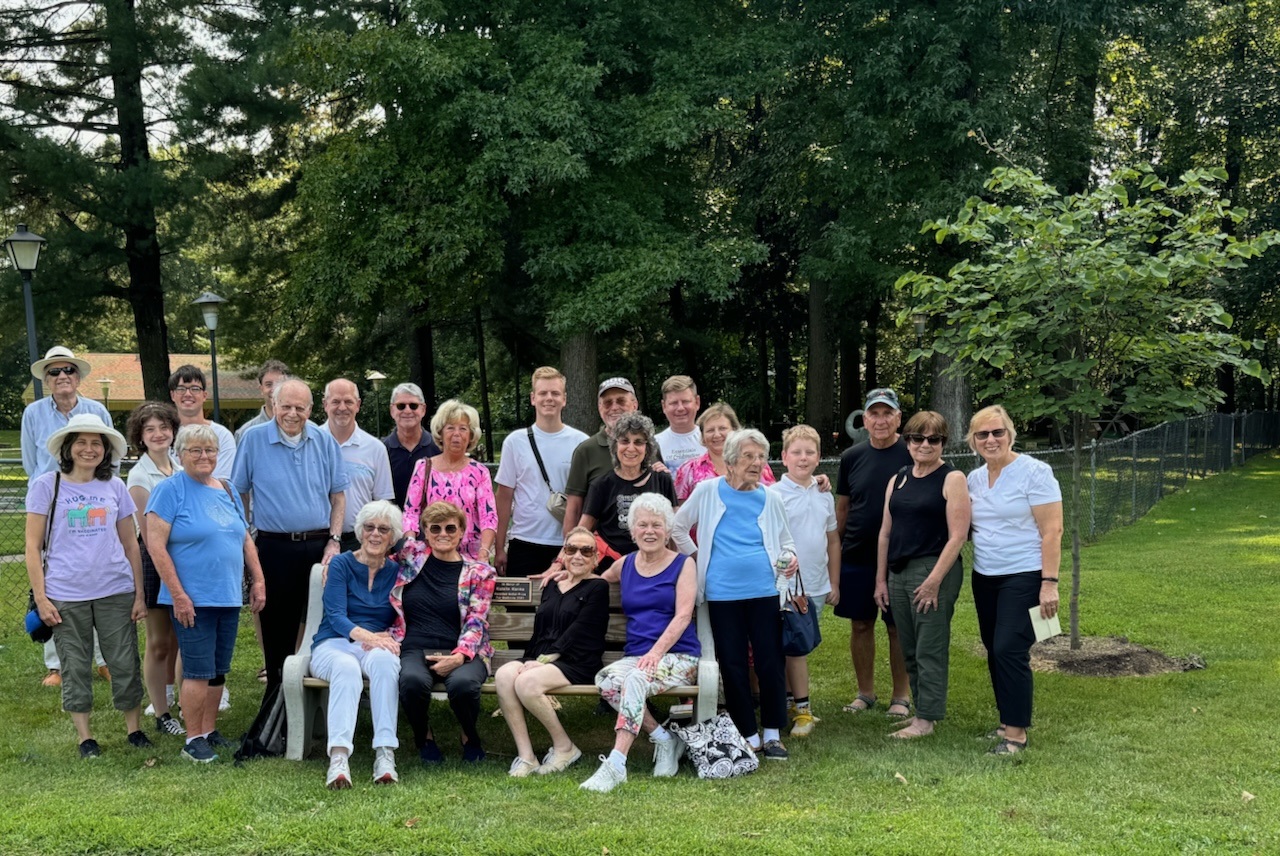
Katalin Karikó used to start each day with a morning run. That’s just one of the many insights the Nobel laureate professor shared during a press conference hosted by the University of Szeged to announce an upcoming two-day conference on mRNA, often called the ‘Swiss army knife’ of medical science. In response to journalists’ questions, Karikó – who played a key role in bringing the conference to Szeged – discussed her research and explained why she invited a former fellow student from university and an old acquaintance from her hometown of Kisújszállás to deliver talks at the symposium.
We asked the Nobel laureate professor from the University of Szeged how things have been for her since her last visit to Szeged. While news reports may give the impression that, since winning the Nobel Prize, Katalin Karikó’s days still revolve around award ceremonies, her daily life tells a different story.
Central Europe’s first mRNA conference boasts an extraordinary lineup of speakers, with the University of Szeged set to host the world’s top scientists in messenger RNA research on November 7–8, 2024.
At the press conference held on September 12, 2024, to announce the mRNA Conference Szeged and its program, it was noted that the symposium itself is connected to an award – specifically, the Novo Nordisk Foundation’s prize. This is because the prestigious honor, awarded jointly to Katalin Karikó, Drew Weissman, Özlem Türeci, and Uğur Şahin in 2022 by one of the wealthiest foundations supporting scientific research, also came with funding for a professional conference. The University of Szeged, Katalin Karikó’s alma mater, is proud to host this remarkable event, which will be held in Szeged largely due to the Nobel laureate’s efforts to bring the conference to the Hungarian city.
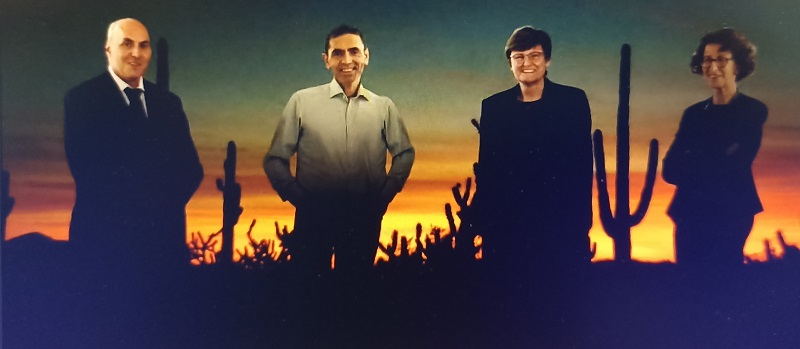
This short video showcases the four pioneering researchers in the fight against Covid-19, portraying them in cowboy-movie style.
The 2022 Novo Nordisk awardees, Katalin Karikó and her Nobel laureate research partner Drew Weissman, along with Uğur Şahin, founder and CEO of the German biotech company BioNTech, will visit Szeged to deliver presentations that are expected to draw significant attention to the event.
Szeged is honored to welcome several renowned mRNA researchers, true stars of the scientific community. Among them are two alumni of JATE (József Attila University), one of the legal predecessors of the University of Szeged.
“I would have been happy to welcome, in addition to biologists Tamás Kiss and Norbert Pardi, a third JATE alumnus, chemist János Ludwig. He was the only one who declined to participate, but he might still change his mind,” Katalin Karikó said when asked by journalists about her motivation for inviting these specific researchers to present at the conference in Szeged.
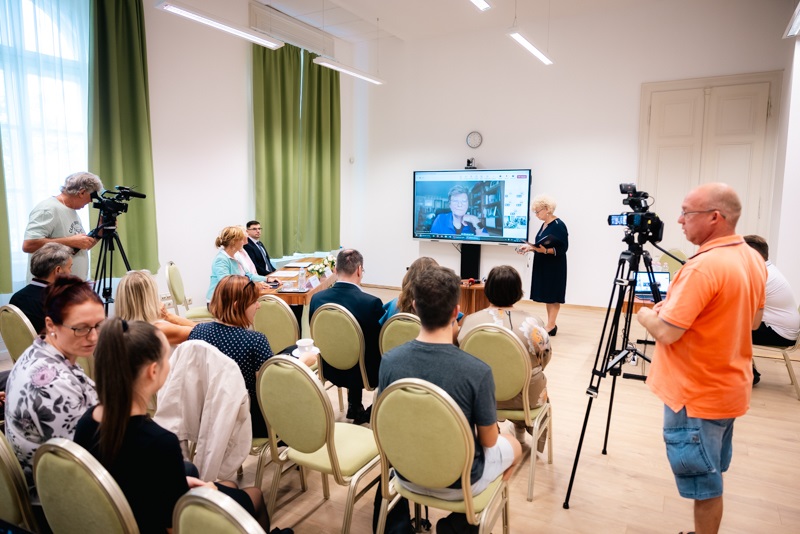
Katalin Karikó, Nobel Prize-winning professor from the University of Szeged, joined the press conference online from her home.
“Our goal is to understand how living organisms function,” states the opening sentence on the website of the Toulouse Centre de Biologie Intégrative (CBI), the current workplace of Tamás Kiss.
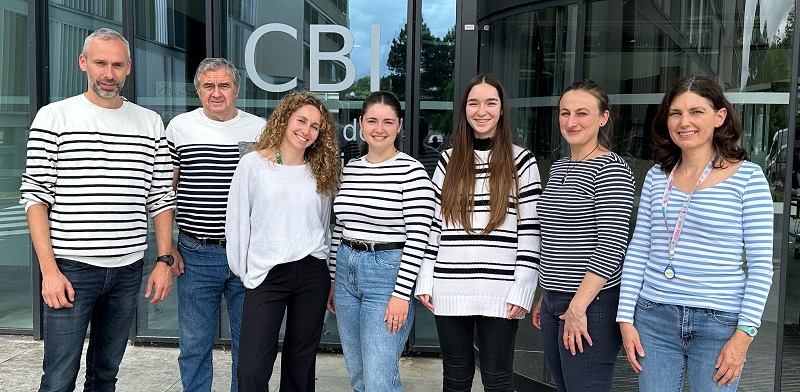
Tamás Kiss (second from the left) with his research team. Photo: CBI
“Tamás Kiss graduated in biology from the university in Szeged a year after me. We both lived in the Herman Ottó Dormitory and worked together at the Biological Research Center in Szeged. While working with RNA, there was a specific type of the molecule I didn’t need, so I kept passing it on to Tamás for his experiments. I have always followed his research closely. This is exactly what I recommend to today’s students: stay informed about each other’s scientific work,” advised Nobel Prize-winning researcher Katalin Karikó, reflecting on her own experience.
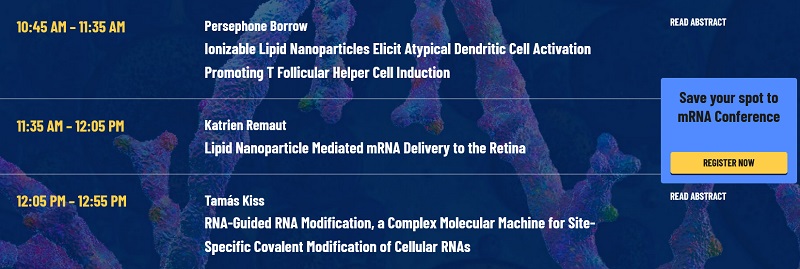
Highlights from the list of presentations at the mRNA Conference in Szeged
Katalin Karikó is proud of Tamás Kiss for his discovery of small nucleolar RNAs (snoRNAs) and the subsequent proof he provided on how these small RNA molecules are utilized by cells.
“In 1996, Tamás Kiss received a standing ovation at the first RNA Society Meeting held in Madison, Wisconsin, reflecting the scientific community’s excitement over his breakthrough in uncovering the secret of snoRNAs. He also published two outstanding articles on his findings in the journal Cell,” Katalin Karikó recalls.
“Listen, Tamás, I need to modify mRNA,” said mRNA researcher Karikó over the phone to the biologist she had known since their university days in Szeged. However, the researcher, whom she had also worked with at the Biological Research Center in Szeged, explained that this would require a rather complex approach, extending beyond the scope of in vitro solutions.
“I’ve invited him several times to the conference we’ve been organizing annually for the past ten years, in cooperation with researchers from BioNTech, Moderna, and CureVac. I’m very happy that Tamás Kiss is a speaker at our mRNA conference this year, especially since we haven’t met since the event in Madison.”
For two years, Katalin Karikó worked side by side with her mentee, Norbert Pardi, in the laboratory at the University of Pennsylvania. Pardi began his studies in biology at József Attila University in Szeged and completed his PhD in biochemistry at the University of Szeged.
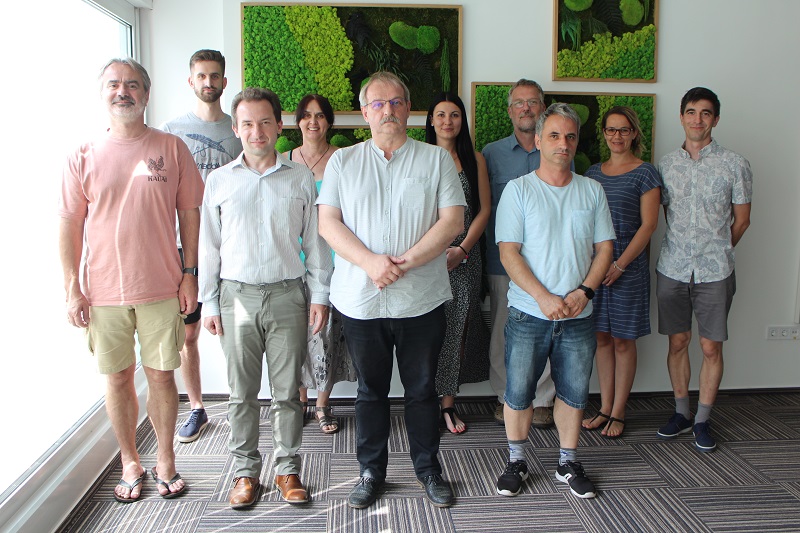
Expertise in nucleoside-modified mRNA technology is considered a competitive advantage, according to the Hungarian National Laboratory of Biotechnology. In this context, Katalin Karikó and Norbert Pardi’s lasting contributions to the development of this method are indisputable. It is also notable that both biologists graduated and earned their doctorates from the University of Szeged, beginning their careers at the Szeged Biological Research Center. Norbert Pardi (front row, second from the left), who now heads his own laboratory at the University of Pennsylvania, is also involved in the work being done at the mRNA laboratory of the Biological Research Center. Along with most of the researchers at the Szeged Biological Research Center, the head of the National Laboratory of Biotechnology, Miklós Erdélyi (front row, second from the right), also earned his doctorate from the University of Szeged. Photo: I.Ú.
“It was Norbert Pardi’s experiments that determined which lipid should be used to ‘package’ the modified mRNA. He has conducted pivotal research and now runs his own laboratory at the University of Pennsylvania. He also secured a grant from the National Institutes of Health and became a tenured professor. I’m very proud of him; he has achieved everything I never have,” said Katalin Karikó at the press conference for the upcoming mRNA conference, concluding her remarks on the list of speakers.
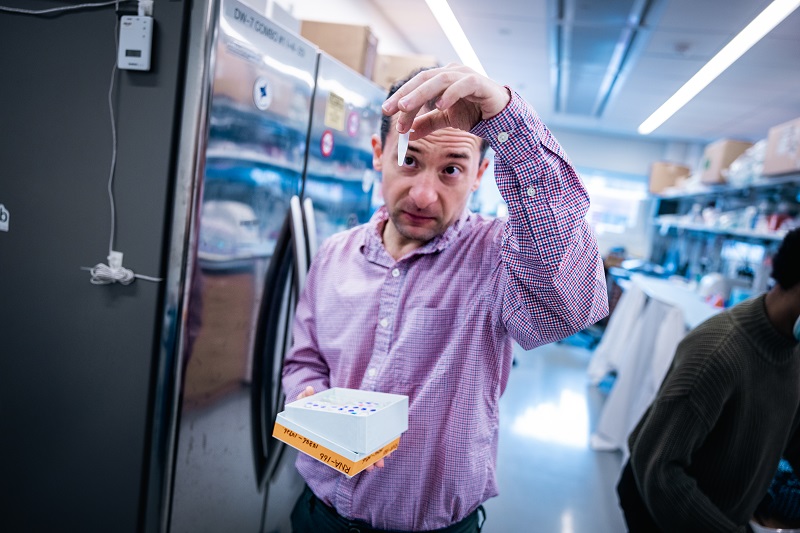
Norbert Pardi’s presentation at the mRNA Conference Szeged is titled “Lipid Nanoparticles for mRNA Vaccine Delivery”. Photo: István Sahin-Tóth
“Let’s support one another! Let’s cheer each other on! This way, by working together, we have a better chance at success!” said the Nobel Prize-winning professor from the University of Szeged, offering words of encouragement and emphasizing that success is built on mutual trust, which is often particularly strong among compatriots. At the press conference, she illustrated her point by mentioning that Norbert Pardi’s grandfather and her own father had worked at the same butcher shop. That is how the connection between the two researchers spans the globe – from Katalin Karikó’s hometown of Kisújszállás to Pennsylvania and back.
At the press conference, Katalin Karikó shared a story to illustrate how she has been spending her days lately. Recounting a small, friendly celebration she recently attended in Philadelphia, she revealed that the residents of her street set up a bench and planted a tree in her honor as a gesture of respect. She added that she and her family have lived in their current home since 1989 and that she knows the neighborhood well, as she used to go for a run around the block every morning.
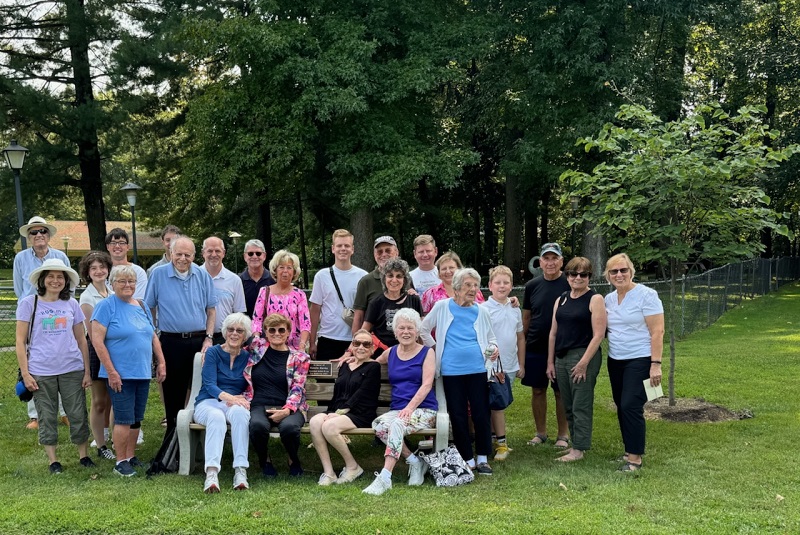
Residents of the green, suburban neighborhood in Philadelphia where Katalin Karikó lives planted a tree and set up a bench in honor of their Nobel Prize-winning neighbor. Photo: K.K.
“I spend the first half of my day responding to emails and messages. There are many events being organized for this fall, and I need to prepare for those as well. Yesterday, I was in Washington, and this weekend I’m traveling to San Diego, where I’ll also be giving a lecture,” she explained while outlining her schedule.
As reported by the United States National Library of Medicine (NLM) website and the University of Szeged’s news portal, the Karikó–Şahin–Türeci research trio has been honored with the Distinguished Medical Science Award.

Katalin Karikó and her research partner from Germany, Özlem Türeci, cofounder and Chief Medical Officer of BioNTech, received the award at the NLM Awards Gala in Washington, presented by the vice president of the organization, Dr. E. Andrew Balas, a native of Hungary.
Among the activities of the National Library of Medicine (NLM), Katalin Karikó considers the operation of the PubMed and the ClinicalTrials.gov database to be the most important service. At the press conference, she pointed out that the databases on the NLM website are freely accessible from anywhere in the world, enabling those interested in the Szeged mRNA Conference or mRNA research to find clinical trials involving mRNA. This allows individuals to access information about what test substances are available at specific hospitals for the treatment of particular conditions.
“I tried to get some rest during the summer, even though there was something happening almost every day. It was especially nice to have a few days now and then without any commitments. I really do enjoy those so-called ‘boring days’. Of course, even those aren’t really ‘boring.’”
Katalin Karikó’s memoir, Breaking Through: My Life in Science, is now available in 11 languages. At the press conference, the Nobel Prize-winning professor mentioned that, over the summer, several film crews had visited her home in Philadelphia to record video footage for various book launch events.
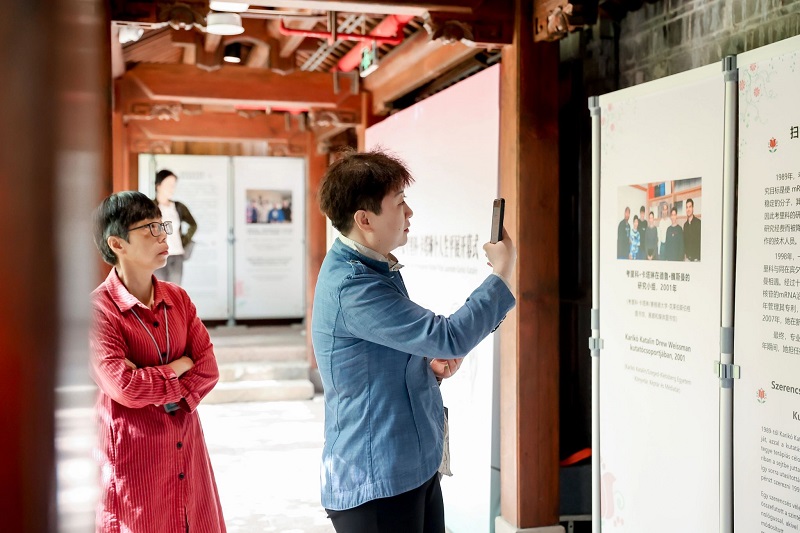
The exhibition showcasing Katalin Karikó’s life journey and highlighting the impact of mRNA research has been presented in several major cities across China.
Katalin Karikó has also been invited to Korea and China, but she continues to try to decline as many invitations as possible to ensure she has enough time for what matters most – science.
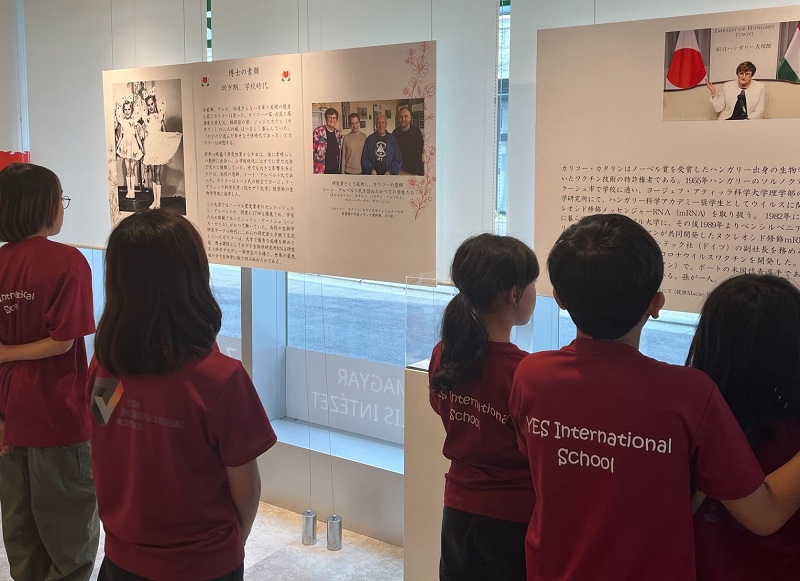
Katalin Karikó is highly esteemed in Japan.
The significance of Katalin Karikó’s research has been highlighted in exhibitions that continued to attract visitors in Japan and China throughout the summer months. These include the exhibition at the Liszt Institute of the Hungarian Cultural Center in Tokyo between May 28 and August 2, titled “My Life in Science – Hungary’s First Female Nobel Laureate”, and the exhibition at the Pasteur Institute in Paris, which opened on September 20, 2024.
In the summer, Katalin Karikó gave an online interview to two PhD students from the Pasteur Institute as part of the institute’s tradition of naming each incoming group of students after a distinguished individual. In preparation for the notable event of having the entire group named after Katalin Karikó, the two young researchers, Nicole Bertola and Aline Grata, asked Professor Karikó questions about the early stages of her career as well as the future of mRNA technology. The interview, available here, is now part of the Pasteur Institute’s scientific-educational exhibition.
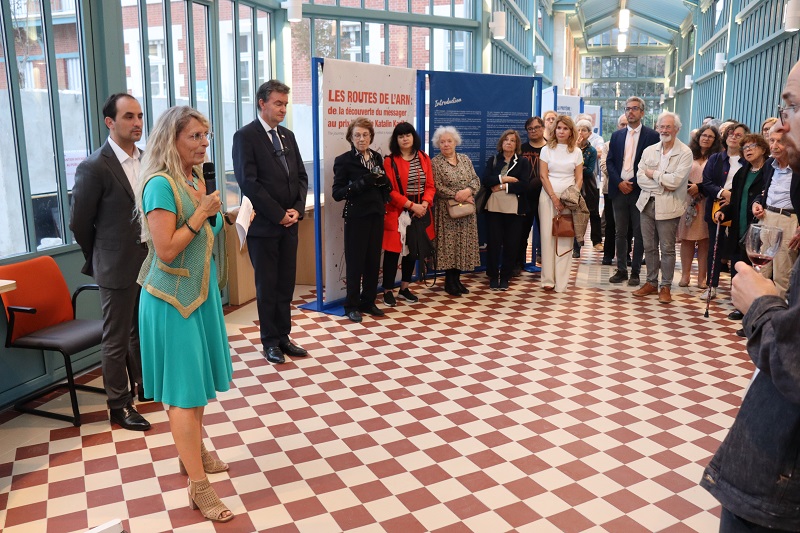
The exhibition showcasing mRNA research and Katalin Karikó’s life journey opened on September 20, 2024, with Hungary’s Ambassador to France, Georg von Habsburg, in attendance. Photo: Norbert Somogyi
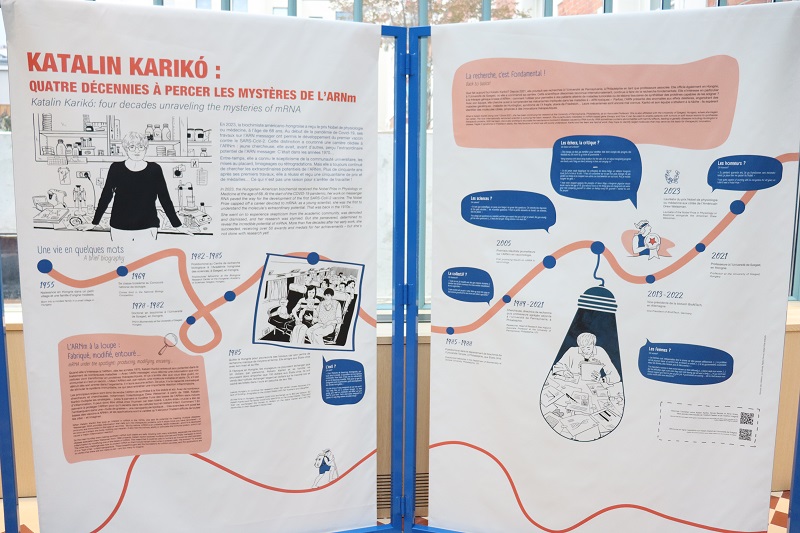
The exhibition highlighting the remarkable mRNA molecule and Katalin Karikó’s career will travel from Paris to various campuses of the Pasteur Institute. The displays were designed by French graphic artist Céleste Gangolphe. Photo: Norbert Somogyi
The Paris exhibition dedicated to Katalin Karikó highlights the life and groundbreaking research of the Hungarian biochemist who, along with Drew Weissman, was awarded the 2023 Nobel Prize in Physiology or Medicine for their discoveries in biochemistry. Presented in both English and French, the exhibition follows the story of messenger RNA, from fundamental discoveries in molecular biology to its revolutionary use in vaccinology, all through a unique artistic and graphic approach that makes the science accessible to the general public. Beginning at the end of September, the exhibition will travel to various campuses of the Pasteur Institute, with plans to showcase the displays, designed by French graphic artist Céleste Gangolphe, at other leading scientific centers across Europe.
Original Hungarian text by Ilona Újszászi and Imre Vida-Szűcs
Photos by István Sahin-Tóth, K.K.
Previous articles on the mRNA Conference Szeged:
University of Szeged to host two-day conference on the ‘Swiss Army knife’ of medical science
Further information about Katalin Karikó, Nobel Prize-winning professor at the University of Szeged, is available at:
- Katalin Karikó’s Journey to the Nobel Prize and Beyond, a permanent exhibition presented in Hungarian and English at the József Attila Study and Information Center of the University of Szeged, open during regular hours (Address: Szeged, Ady tér 10)
- Katalin Karikó, a virtual exhibition by the Klebelsberg Library at the University of Szeged (in Hungarian, English, French, German)
- The Katalin Karikó page on the University of Szeged website (in Hungarian and English)

